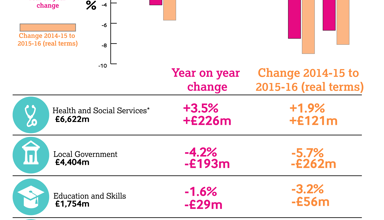Introduction
Following the Scottish Independence Referendum the Smith Commission produced cross-party proposals for a new devolution settlement. On 22 January 2015 the UK Government published their response to these proposals in a command paper ‘Scotland in the United Kingdom: An enduring settlement’. This includes draft clauses for legislation which would be taken forward by the next UK Government.
Chapter 2 of the command paper outlines the UK Government’s plans for a new fiscal framework (paragraph numbers shown below). This blog shows how the proposed fiscal framework for may be of relevance to Wales.
Principles to underpin a new fiscal framework for Scotland
UK Government position in Command Paper 2.4.1. An updated fiscal framework is required for the new tax and spending powers, including on welfare spending. 2.4.2. The Barnett formula will continue to be used. The block grant will therefore be determined by the Barnett formula, a deduction for tax devolution, and an addition to block grant for welfare programmes (plus existing tax and borrowing powers). 2.4.6. ‘No detriment’ principle over initial transfer of funding means that neither UK or Scotland budgets should be smaller or larger simply due to initial transfer of powers. 2.4.8. An indexation method has been agreed for indexing the initial adjustment to the Scottish block grant for the Scottish rate of income tax. The adjustment will be indexed against growth in the UK income tax base. 2.4.10. While the Barnett formula will continue to be used to adjust the spending on the newly devolved public services, this will not be appropriate for the devolved welfare spending. This is because welfare spending does not appear within the Departmental Expenditure Limits that apply to the Barnett formula. Instead, the UK and Scottish Governments will need to reach annual agreements over the amount of welfare spending that should be transferred. 2.4.12. UK and Scottish agreements will need to agree UK’s share of the costs of implementing further devolution. 2.4.14-15. There should be ‘no detriment’ for Scotland or UK budgets as a result of subsequent policy decisions by either body. This will require further agreements on the tax deduction element of the funding model as changes in the ‘rest of UK’ taxes may impact the funding received by Scotland through the Barnett formula. 2.4.16. There are some complex relationships between policies and outcomes which will also require further agreement; e.g. whether Scotland should receive a share of DWP’s savings in benefits spending as a result of Scottish employment programmes reducing the UK benefits bill. 2.4.24. The UK and Scottish Government will need to agree whether additional borrowing powers can be subject to a ‘prudential regime’ similar to that in local government. 2.4.29. The new funding model should be mechanical rather than requiring negotiations, although it will need regular review. Relevance to Wales
- Welfare spending is not currently expected to be devolved to Wales, although it can be seen that this would be a complex area to devolve.
- The St David’s Day process may recommend the devolution of additional powers to Wales. Any changes to the Welsh fiscal framework could be similar to those proposed in Scotland.
- The agreements which are made in Scotland over the tax deduction element of the funding model may also be applied to Wales.
- A Welsh rate of income tax will be devolved under the Wales Act 2014, subject to a referendum. It is likely that the same indexation method agreed for Scotland will be used for adjusting the Welsh block grant. The Scottish indexation method appears to match the recommendations made by the Holtham Commission for Wales.
Independent fiscal scrutiny
UK Government position in Command Paper 2.4.31-34. Independent fiscal scrutiny is essential and the Scottish Government should enhance existing arrangements. The role, capacity and resources of the Scottish Fiscal Commission should match the expanded responsibilities. Relevance to Wales
- The National Assembly for Wales Finance Committee’s Budget Process inquiry is considering the issue of whether to create a fiscal commission for Wales. The UK Government see the Scottish Fiscal Commission as a key part of the devolution of fiscal powers.
Joint Exchequer Committee (JEC)
UK Government position in Command Paper 2.4.37. The JEC between UK and Scottish Ministers will ensure the joint implementation of the new fiscal framework by the UK and Scottish Governments. Annual implementation reports will be produced, as has occurred under the Scotland Act 2012. Relevance to Wales
- A JEC has been created for Wales to implement the Wales Act 2014. This could evolve along the same lines as in Scotland should Wales acquire further devolved powers.
- The relationship between the quadrilateral meetings of the devolved administrations’ finance ministers with the Scottish JEC will need to be considered to ensure that Welsh Government is able to comment on elements of Scottish devolution which are of relevance to Wales.
Article by Richard Bettley, National Assembly for Wales Research Service.






